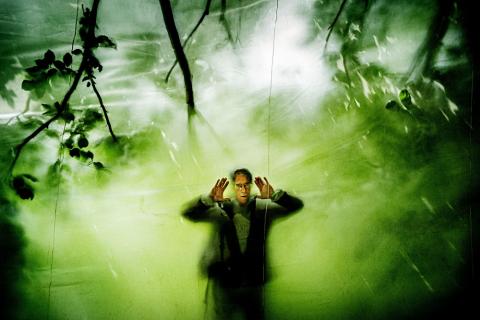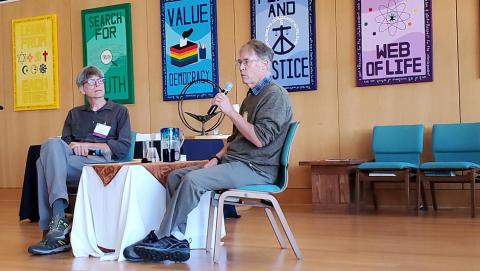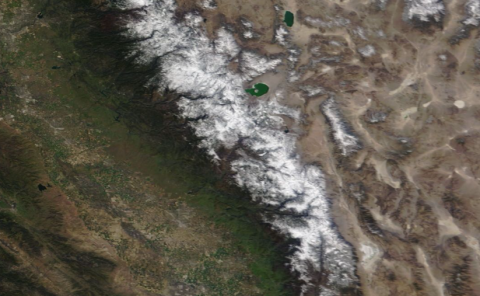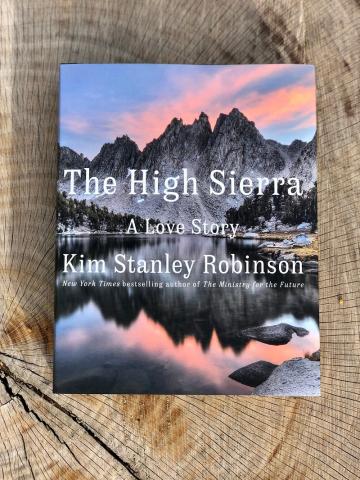Ministry still riding the (heat) wave
Submitted by Kimon
"Article 14 of the Paris Agreement Under the United Nations Framework Convention on Climate Change called for a periodic taking stock of all the signatory nations’ carbon emissions, which meant in effect the total global carbon burn for the year in question. The first “global stocktake” was scheduled for 2023, and then every five years after that. That first global stocktake didn’t go well."
Thus begins Chapter 3 of The Ministry for the Future. But it could very well be a headline of the coverage of COP28 in December 2023, in our very real world! 2023 was the hottest year of the Anthropocene, and the heat wave kicking off Ministry makes it a timely and obvious starting point for discussing these issues.
Kim Stanley Robinson has been talking tirelessly about Ministry for the past three years now with no sign of slowing down! In November, he visited several countries in Europe.
Dutch editor VPRO produced this nice short video that can serve as a layman's introduction to KSR and to Ministry (some parts are in Dutch but they are short): "Voorbij de klimaatcrisis met Kim Stanley Robinson"
While in Rotterdam, he was interviewed by the Financial Times (with a lot of detail about the menu!): "If the world fails, business fails"
Robinson tells me he has been invited to meetings about the future with central bankers and defence department officials, as well as associations of hedge fund managers, although he can’t share their names. “They don’t want to shake the confidence of the world by telling [everyone] that they’ve been consulting with a crazy science-fiction writer . . . They thought it might shake the stock markets.”
In Switzerland, Stan gave a talk at ETH Zürich (which has been featured in a few of his works): see a report with photos from that event.
Also in Switzerland, he gave a talk at the World Trade Organization, together with WTO Director-General Ngozi Okonjo-Iweala: "Harnessing the Power of the International Trade System to Respond to the Climate Crisis" (panel on YouTube)
In Germany, the German translation of Ministry was awarded the Carlowitz Sustainability Award (named after the "father" of sustainable forestry), see also publisher Heyne press release.
Several of Stan's interviews in French media are very interesting -- going beyond just talking about the issues around Ministry but more in general about his influences, his view on literature and science fiction, looking back on his career... Material in English is noted below.
Interview at Blast (alternative media): "Un ministère du futur face à l'urgence climatique" (in English):
Interview at the podcast C'est plus que de la SF ("it's more than science fiction"): "Le Ministère du Futur par Kim Stanley Robinson" (in English)
Interviews for purely French speakers:
- Podcast at Le Book Club of France Culture (public radio): "Kim Stanley Robinson et le monde de demain" (all-French)
- Reporterre: "Chaque milliardaire est un échec politique" ("every billionaire is a political failure")
- Libération: "Ce roman fait de moi une sorte de ministre du futur" ("this novel makes me a sort of minister of the future")
- Usbek & Rica: "Chaque milliardaire est un échec politique" ("every billionaire is a political failure") & "Le changement climatique s’est emparé de la science-fiction de futur proche" ("climate change has taken over near-future science fiction")
- La Croix: "L’utopie est l’espoir de notre temps" ("utopia is the hope of our time")
- Socialter: "La science-fiction est le réalisme de notre époque" ("science fiction is the realism of our times")
- Ouest-France: Kim Stanley Robinson, un maître de la science-fiction écologique réaliste (a master of ecological realist science fiction)
- En attendant Nadeau: "Les romans doivent être un plaisir" ("novels must be a pleasure")
- Mediapart: "Nous vivons dans un monde de science-fiction" ("we live in a science fiction world") (paywall)
- Le Nouvel Observateur: "Je suis anticapitaliste, mais j’essaie d’être réaliste" ("I am an anticapitalist, but I try to be realist") (paywall)
- Philosophie Magazine: "Le ministère du Futur est une nouvelle utopie" ("the ministry for the future is a new utopia") (paywall)
- Plus, from French-speaking Switzerland, Le Temps: "C’est une fiction climatique où nous faisons de notre mieux et où ça marche" ("it's a climate fiction where we do our best and where it works") (paywall)
- And from French-speaking Belgium, Le Soir: "Pour s’assurer un avenir, nous devons dépasser le capitalisme" ("to ensure ourselves a future, we must go beyond capitalism") (paywall)
And, last but not least, Stan's panel at the Utopiales science fiction conference in Nantes, France (that he had also visited in 2006) (in English):
I will catch up with more Ministry-related and High Sierra-related interviews in the next update.
Meanwhile, here are some reviews for Ministry:
- Penelope Prime for Global Atlanta
- Jim Reed for Global Atlanta
- Andy Pollak for Slugger O'Toole
- M.T. Bennett for the Good Men Project
- Dean Spade for In These Times
- Lee Zimmerman for Tikkun
- Steffen Vogel for Blätter (German)
- Stefan Sasse for Deliberation Daily (German)
- Hughes for Charybde 27 (French)
- Le culte d'Apophis (French)
- LAmiSelbon for Vive la SFFF! (French)
- Thomas for Constellations (French)
- Gromovar for Quoi de neuf sur ma pile? (French)
- L'épaule d'Orion (French)
- Nicolas Winter for Juste un mot (French)
- Les lectures du Maki (French)
- Erdorin / Blog à part (French)
- Lorhkan (French)
- Anthony Glinoer for Le Monde Diplomatique (French)
- Marjorie Adelson for BFM TV (video) (French)
- Pablo Maillé for Usbek & Rica (French)
- Sylvie Molines for Courrier Picard (French)
And some sightings of Ministry in book lists and other recommendations:
- International Institute for Management Development: Winter’s tales to thrill and chill you
- PLOS Early Career Research Community: A Christmas Climate Reading Booklist
- Niskanen Center: Suzette Brooks Masters
- Argus-Courier: Petaluma (CA) top selling titles
- Portland Press Herald: readers recommendations
- Digg: Five Underappreciated Sci-Fi Novels To Read This Summer
- The Review Geek: Must-Read: 10 Best Books on Saving the Planet
- The Spinoff (New Zealand): The book Raf Manji wishes he never read
- The National: Eight climate fiction, or cli-fi, books to consider before Cop28
- Forbes: 16 Must Have Books And Podcasts For Leaders In 2024
- EnergieWinde: Kleiner Kanon der Klimaliteratur (German)
- Freude der Zeit: Was Wir Lesen: Melika Forutan (German)
- James Cameron has read it
- Thomas Piketty has read it too (and he met KSR in Paris)
In addition, Ministry found its way in this interesting art-meets-science project: A Future Manual For Future Models: An Artist’s Guide on How to do Integrated Assessment Modelling Differently
And it inspired a short story challenge at the Spectator.
Then, Ministry book clubs! Here's one in Martha's Vineyard and I'm sure there are others out there. With this book club by Wonkette, there were several articles discussing aspects of it:
- A (Climate) Change Is Gonna Come
- Hope To Do Some Good, No Matter How F*cked Up You Are
- Hot And Cold Running Crises
- Climate Dreams And Flying Machines
- The Everything Feeling And An Earthquake In The Head
- A Future Up In The Air
Finally, as the world continues to wake up to the reality of climate change and mobilize resources to counter it, lots and lots of articles make reference to Ministry in more or less detail. Here is a selection, the list is long and I'm sure there are more out there!
- Mint: Private geo-engineers are just winging it to shade the planet
- News Track (India): Could a global "carbon currency" save the world from global warming?
- Diálogo Chino: Geoengineering in Latin America may create more problems than it solves
- OODA Loop: Another Daunting Dispatch from the Ministry of the Future: ConocoPhillips’ Project Willow Will Freeze Melting Artic
- Reuters: Policy Watch: The IPCC has given us a roadmap to a safe future for humanity. But will we follow it?
- Grist: Radical eco-activists have made it into mainstream fiction. Is reality next?
- Campbell River Mirror: Look to science fiction to learn how to save the world
- Reactor Mag: Mid-Apocalyptic Fiction: Writing Against a Climate Catharsis
- BBC: Heatwave: Is India ready to deal with extreme temperatures?
- Wonkette: Climate Crisis Well Into 'Just Like Science Fiction' Territory
- Economic Times (India) Energy World: A clarion call - The urgency of a Bharat Heat Action & Adaption Plan
- Pajiba: Corporations Are Incompatible With the Future of Humanity
- The Conversation: Increasing heat is already a factor in human migration
- ZeroHedge: Blocking Out The Sun
- The Mary Sue: No, Ben Shapiro, Air Conditioning Won’t Save You From Climate Change
- El País Mexico: The heat that is coming for us / in Spanish: El calor que viene por nosotros
- IISD SDG Knowledge Hub: Climate Change Has a Hitman: Responding to Extreme Heat
- Common Dreams: It Isn't Nice, But Climate Activists Will Block the Doorways
- The Michigan Daily: Consider the carbon coin
- Literary Hub: On the False Promise of Climate Fiction
- The Main Monitor: Why climate fiction matters
- New York Daily News: Woodrow Wilson’s cautionary tale
Long story short, Ministry is still being widely discussed. With this infodump out of the way, be on the lookout for a future update with more varied material!
(Illustration: Miguel Bucana for Socialter Magazine)




